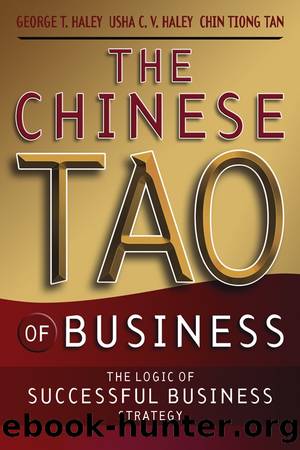The Chinese Tao of Business by George T. Haley & Usha C. V. Haley & Chin Tiong Tan

Author:George T. Haley & Usha C. V. Haley & Chin Tiong Tan
Language: eng
Format: epub
Publisher: Wiley
Published: 2011-09-12T00:00:00+00:00
Extracting contractual obligations
Historically, Chinese managers entered into and maintained contractual relationships with expectations of quick profits. The Chinese merchant classes, both PRC and Overseas Chinese, seek fairly immediate, tangible returns and maintain substantial holdings of liquid assets.40 Many will not honor contracts, especially with foreign companies, which appear as loss-making propositions.
Prompted by national duty and a desire for profit, present-day Chinese companies frequently seek to accomplish both their own and governmentsâ goals, which can also hurt written contracts. The PRCâs companies, for instance, operate under government policy directives to acquire advanced technologies at every opportunity. However, many of their competitive advantages revolve around labor-intensive rather than the capital-intensive technologies which the Western companies possess. Consequently, this directive violates the Chinese companiesâ economic interests and may lead to contractual violations. As indicated in Chapter 4, many foreign companies have found their local partners violating their brand names to sell inferior, but cheaper, products for the local markets.
As we saw in Chapter 5, in Chinese companies, signed contracts may signal the beginning, rather than the end, of negotiations. Traditionally, significant changes in business situations, or the discovery of new facts as managers learned about new markets, justified renegotiating contractual terms.41 Consequently, commercial partners should expect periodic quibbling over contractual terms as their business relationships evolve. For instance, many SOEs requested renegotiation of their loan agreements with Western banks, or loan-payment sabbaticals, due to difficulties stemming from the restructuring of the Chinese economy. When Western banks, such as Deutsch Bank, declined or protested, the SOEs refused to render payments. Western banks sometimes roll over debts when their major corporate clients cannot meet obligations; however, in Chinese business practice, this rollover stems from the clientâs reputation and history of dealings, not their relative size and importance.
Conflicting government goals have also resulted in forced renegotiation and reinterpretation of large-scale signed contracts. These renegotiated contracts have especially hit foreign companies in the power industry, which has displayed great vulnerability to renegotiated contracts. As Raymond Vernon outlined over four decades ago, companies in this sector fall prey to the âobsolescing bargainâ with governments; the companies lose power over time because of large fixed investments and an inability to leave without incurring large losses.42 Investors in the power industry must put up hundreds of millions of dollars before they see any return; since electricity constitutes a public good, the investors base their calculations on negotiated long-term agreements with provincial governments rather than market expectations. In China, power plants supply provincial rather than national electricity grids. Provincial power bureaux negotiate contracts and buy the power. These bureaux also obey provincial regulators and provincial government officials who respond to the concerns of local citizens, especially on prices. As Chinese contract law remains underdeveloped, foreign companies can leave China, or continue to operate in loss-making conditions, if the provincial governments renegotiate their contracts offering unfavorable terms.
Begun in 1998, and involving 17 high-profile international creditors, the Meizhou Wan power plant illustrates this obsolescing bargain. Built as a build-operate-transfer project, the investors planned to transfer the plant to the Fujian government in 20 years.
Download
This site does not store any files on its server. We only index and link to content provided by other sites. Please contact the content providers to delete copyright contents if any and email us, we'll remove relevant links or contents immediately.
China Rich Girlfriend by Kwan Kevin(3896)
The Silk Roads by Peter Frankopan(3764)
Annapurna by Maurice Herzog(2842)
Hot Thai Kitchen by Pailin Chongchitnant(2814)
Full Circle by Michael Palin(2773)
Okonomiyaki: Japanese Comfort Food by Saito Yoshio(2391)
City of Djinns: a year in Delhi by William Dalrymple(2137)
The Ogre by Doug Scott(2115)
Photographic Guide to the Birds of Indonesia by Strange Morten;(2089)
Tokyo by Rob Goss(2018)
Vietnam, Cambodia, Laos & Northern Thailand by Lonely Planet(2015)
Tokyo Geek's Guide: Manga, Anime, Gaming, Cosplay, Toys, Idols & More - The Ultimate Guide to Japan's Otaku Culture by Simone Gianni(1947)
Discover China Travel Guide by Lonely Planet(1867)
Everest the Cruel Way by Joe Tasker(1827)
China (Lonely Planet, 11th Edition)(1799)
Lonely Planet China(1758)
China Travel Guide by Lonely Planet(1741)
Top 10 Dubai and Abu Dhabi by DK Travel(1717)
Iranian Rappers And Persian Porn by Maslin Jamie(1710)
